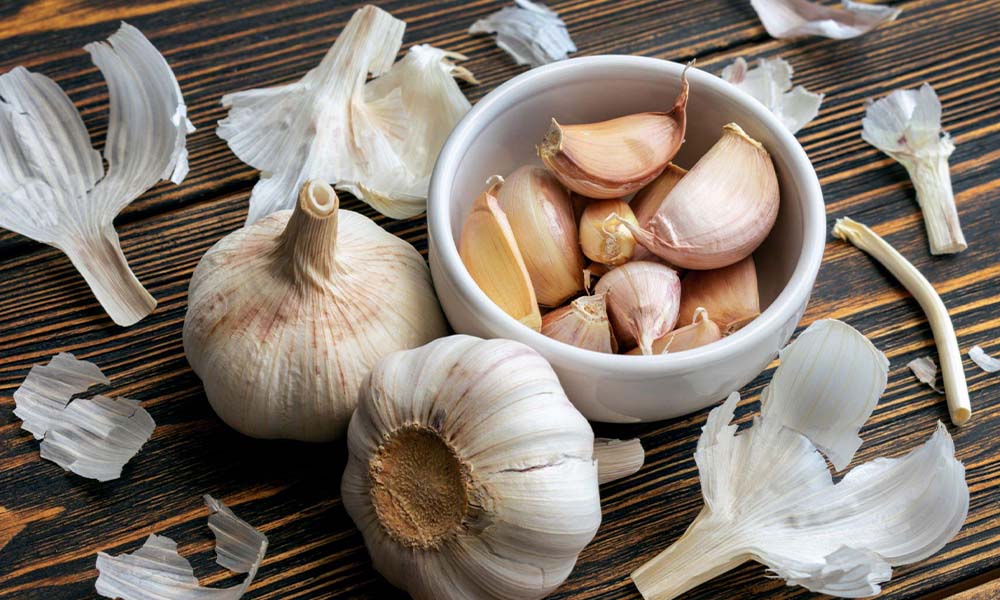Garlic has been revered for centuries for its culinary and medicinal properties. Not only does it add a distinct flavor to dishes, but it also offers a wide range of health benefits. One of the most notable benefits of garlic is its ability to reduce the risk of getting sick. In this article, we will explore the science behind garlic’s immune-boosting properties, its role in preventing and reducing the risk of common illnesses, and how to incorporate garlic into your diet for maximum benefits.
Table of Contents
ToggleThe Science Behind Garlic’s Immune-Boosting Properties

Garlic contains a compound called allicin, which is responsible for many of its health benefits. Allicin has been shown to have potent antimicrobial properties, meaning it can help fight off bacteria, viruses, and fungi that can cause illness. Additionally, garlic is rich in antioxidants, which can help strengthen the immune system and reduce inflammation in the body.
Studies have shown that garlic can enhance the function of certain immune cells, such as natural killer cells and macrophages. These cells play a crucial role in defending the body against pathogens and foreign invaders. By boosting the activity of these immune cells, garlic can help reduce the risk of getting sick and shorten the duration of illnesses.
Garlic’s Role in Preventing and Reducing the Risk of Common Illnesses
Garlic has been traditionally used to prevent and treat various illnesses, including the common cold, flu, and even more serious conditions like pneumonia. Its immune-boosting properties make it a valuable ally in maintaining good health. Regular consumption of garlic can help strengthen the immune system, making you less susceptible to infections.
Research has shown that garlic can also help reduce the risk of cardiovascular disease. It can lower blood pressure, reduce cholesterol levels, and improve blood circulation. By maintaining a healthy cardiovascular system, you can further reduce the risk of developing illnesses and improve your overall well-being.
Research Studies Supporting the Use of Garlic for Immune Health

Numerous scientific studies have been conducted to investigate the immune-boosting properties of garlic. One study published in the Journal of Nutrition found that garlic extract significantly enhanced the immune response in mice infected with a respiratory virus. The study concluded that garlic could be a potential natural remedy for respiratory infections.
Another study published in the British Journal of Nutrition showed that garlic supplementation reduced the incidence of the common cold by 63%. The researchers found that participants who took a garlic supplement had fewer colds and recovered faster compared to those who didn’t.
These studies provide strong evidence that garlic can indeed reduce the risk of getting sick and support immune health. However, more research is needed to fully understand the mechanisms behind garlic’s immune-boosting effects.
Incorporating Garlic into Your Diet for Maximum Benefits
To harness the power of garlic and reduce the risk of getting sick, it’s important to incorporate it into your diet regularly. Luckily, garlic is a versatile ingredient that can be used in a wide variety of dishes. Here are some tips on how to include garlic in your meals:
- Start your day with garlic-infused eggs or omelets. Simply mince a clove of garlic and sauté it in olive oil before adding eggs.
- Add minced garlic to your favorite salad dressings or marinades for an extra flavor boost.
- Roast vegetables with garlic for a delicious and healthy side dish. Toss your favorite vegetables in olive oil, sprinkle with minced garlic, and roast in the oven until golden and tender.
- Make a homemade garlic butter by mixing minced garlic with softened butter and a pinch of salt. Spread it on bread or use it to flavor steaks, seafood, or vegetables.
By incorporating garlic into your daily meals, you can enjoy its immune-boosting benefits and reduce the risk of getting sick.
Other Ways to Use Garlic for Immune Support

In addition to incorporating garlic into your diet, there are other ways to use garlic for immune support. One popular method is to make garlic-infused oil. Simply heat olive oil in a pan and add several cloves of crushed garlic. Allow the garlic to infuse the oil for a few minutes, then strain the oil and store it in a glass jar. You can use this oil for cooking or as a topical treatment for skin infections.
Garlic supplements are another option for those who may not enjoy the taste or smell of raw garlic. These supplements typically contain concentrated amounts of allicin or garlic extract. However, it’s important to choose a reputable brand and follow the recommended dosage. Consult with your healthcare provider before starting any new supplement regimen.
Precautions and Potential Side Effects of Consuming Garlic
While garlic is generally safe for most people when consumed in moderation, there are some precautions to keep in mind. Garlic can interact with certain medications, such as blood thinners, so it’s important to consult with your healthcare provider if you’re taking any medications. Additionally, some people may experience digestive issues, such as heartburn or upset stomach, when consuming raw garlic.
It’s worth noting that excessive consumption of garlic, especially in supplement form, can lead to bad breath, body odor, and even allergic reactions in some individuals. If you experience any adverse effects after consuming garlic, it’s best to discontinue use and consult with a healthcare professional.
Garlic Supplements: Are They Effective?

Garlic supplements have gained popularity in recent years as a convenient way to reap the benefits of garlic without the strong taste and odor. While research suggests that garlic supplements can be effective in supporting immune health, it’s important to choose high-quality supplements from reputable brands.
Look for supplements that contain standardized amounts of allicin or garlic extract. These compounds are responsible for garlic’s immune-boosting properties. It’s also a good idea to consult with a healthcare professional before starting any new supplement regimen to ensure it’s safe and appropriate for your individual needs.
Delicious Garlic-Rich Recipes to Try at Home
If you’re looking to incorporate more garlic into your diet, here are some delicious recipes to try at home:
- Garlic-Lemon Roasted Chicken: Marinate chicken pieces with minced garlic, lemon juice, olive oil, and your favorite herbs. Roast in the oven until cooked through and golden brown.
- Garlic Shrimp Pasta: Sauté minced garlic in olive oil, then add cooked shrimp and toss with your favorite pasta. Finish with a sprinkle of Parmesan cheese and fresh parsley.
- Garlic Parmesan Roasted Potatoes: Toss quartered potatoes with minced garlic, olive oil, grated Parmesan cheese, and seasonings. Roast in the oven until crispy and golden.
These recipes showcase the versatility of garlic and how it can elevate the flavors of any dish while providing immune-boosting benefits.
Frequently Asked Questions
How does garlic help reduce the risk of illness?
Garlic contains compounds like allicin, which have antimicrobial and immune-boosting properties. These compounds can help the body fight off infections and reduce the risk of falling ill.
What are the active compounds in garlic that contribute to its immune-boosting properties?
The active compounds in garlic include allicin, sulfur compounds, and antioxidants like quercetin. These components work together to enhance the immune system and protect against illness.
Can garlic be consumed in different forms, such as raw, cooked, or as supplements, to reap its health benefits?
Yes, garlic can be consumed in various forms to reap its health benefits. While raw garlic may have the highest concentration of active compounds, cooking it can also retain some of its beneficial properties. Garlic supplements are another option, but it’s essential to follow recommended dosages.
Are there specific illnesses or conditions that garlic is particularly effective at preventing or alleviating?
Garlic is known to be effective in reducing the risk of common illnesses like colds and flu due to its immune-boosting properties. It may also have a role in reducing the risk of heart disease and lowering blood pressure.
Is garlic safe for everyone to consume, or are there any contraindications or side effects to be aware of?
While garlic is generally safe for most people when consumed in moderation as a food ingredient, excessive consumption or garlic supplements may lead to side effects such as digestive issues or allergic reactions. It’s advisable to consult with a healthcare professional, especially if you have specific health concerns or are taking medications.
How much garlic should one incorporate into their diet to support immune health?
There is no one-size-fits-all answer, but regularly including garlic in your meals can provide immune support. Aim for a clove or two of garlic a day, whether raw or cooked, as part of a balanced diet.
Are there any creative or tasty recipes that incorporate garlic for those looking to enhance their immune system naturally?
Certainly! Garlic can enhance the flavor of numerous dishes. Try roasted garlic in mashed potatoes, garlic-infused olive oil for salad dressings, or minced garlic in stir-fries and pasta sauces for both taste and immune support.
Conclusion
In conclusion, garlic is a powerhouse ingredient that offers numerous health benefits, including its ability to reduce the risk of getting sick. Its immune-boosting properties, supported by scientific research, make it a valuable addition to any diet. By incorporating garlic into your meals and exploring other ways to use it, you can harness its power and support your immune health naturally.
Remember to consult with your healthcare provider before making any significant changes to your diet or starting any new supplement regimen. Embrace the power of garlic and enjoy its delicious flavor while reaping the benefits of a stronger immune system.


